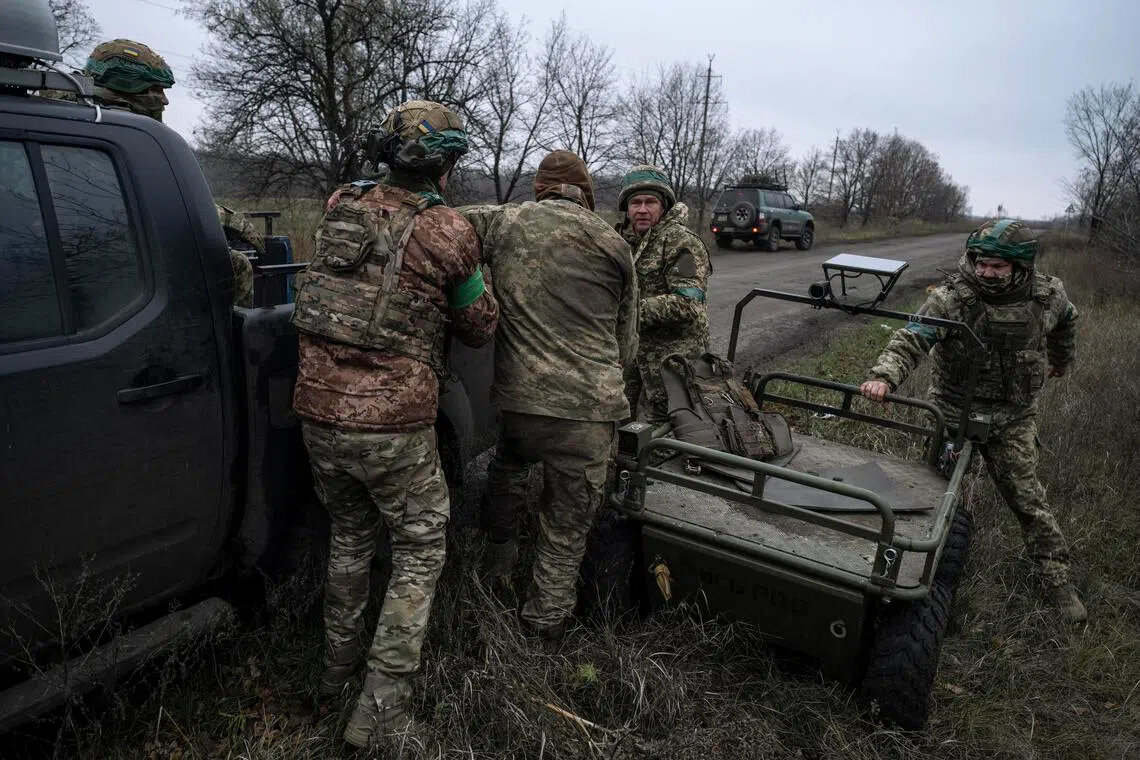Europeans push back at US plan that would force concessions from Ukraine
Sign up now: Get ST's newsletters delivered to your inbox

A US-drafted framework to end the war in Ukraine includes territorial concessions and curbs to armed forces.
PHOTO: EPA
BRUSSELS/KYIV – European countries pushed back on Nov 20 against a US-backed peace plan for Ukraine that sources said would require Kyiv to give up more land and partially disarm, conditions long seen by Ukraine’s allies as tantamount to capitulation.
Two people familiar with the matter told Reuters on Nov 19 that Washington had signalled to President Volodymyr Zelensky that Ukraine must accept a US-drafted framework to end the war
The sources spoke on condition of anonymity because of the sensitivity of the matter.
The acceleration in US diplomacy comes at an awkward juncture for Kyiv, with its troops on the back foot at the front and Mr Zelensky’s government undermined by a corruption scandal. Ukraine’s Parliament fired two Cabinet ministers
Russia has been pounding Ukrainian cities and infrastructure with nightly bombardments, killing civilians and causing power cuts as winter sets in.
The authorities said 22 people were still missing and 26 were dead from air strikes that destroyed an apartment block
The European Union foreign ministers meeting in Brussels were careful not to comment in too much detail about a US peace plan that has not fully been made public.
But they made clear that they would push back against demands for punishing concessions from Kyiv, and said any deal must not deprive Ukraine of the ability to defend itself.
“Ukrainians want peace – a just peace that respects everyone’s sovereignty, a durable peace that can’t be called into question by future aggression,” said French Foreign Minister Jean-Noel Barrot. “But peace cannot be a capitulation.”
Polish Foreign Minister Radoslaw Sikorski said Ukraine, as the victim in the conflict, should not have restrictions imposed on its ability to defend itself.
EU foreign policy chief Kaja Kallas said any agreement must have the Europeans and Ukraine itself on board.
The White House has not commented on the reported proposals.
US Secretary of State Marco Rubio said on social media platform X that Washington would “continue to develop a list of potential ideas for ending this war based on input from both sides of this conflict”.
“Ending a complex and deadly war such as the one in Ukraine requires an extensive exchange of serious and realistic ideas. And achieving a durable peace will require both sides to agree to difficult but necessary concessions,” he said.
A US Army delegation, led by Army Secretary Dan Driscoll and Army Chief of Staff Randy George, was in Kyiv and expected to meet Mr Zelensky late on Nov 20. They met Ukraine’s top military commander, General Oleksandr Syrskyi, late on Nov 19.
Gen Syrskyi said he told them the best way to secure a just peace was to defend Ukraine’s airspace, extend its ability to strike deep into Russia and stabilise the front line.
Fourth winter approaching
With the fourth winter approaching in Europe’s deadliest war in eight decades, Russian troops have been inching forward and are poised to finally capture their first substantial city in nearly two years, the ruined eastern railway hub of Pokrovsk.
Russia, which launched a full-scale invasion of its neighbour
Ukraine says that would amount to capitulation and leave it unprotected should Russia attack again.
After the early months, when Ukraine fended off a Russian assault on Kyiv and recaptured swathes of territory, the war has settled over three years into a relentless grind along a 1,000km front line, with huge losses on both sides.
A Ukrainian counter-attack stalled in 2023, and since then Moscow has made slow but relentless progress, with the enemies separated across a charred no-man’s land, hunting each other’s forces down with drones.
Russian forces now appear poised to capture Pokrovsk, once home to 60,000 people, their first big prize since early 2024.
Moscow says that will lead to further battlefield gains, giving it no reason to halt fighting without big concessions.
Kyiv says the Russian advances have only limited strategic significance, but it lacks the capability to halt them.
US President Donald Trump, who returned to office in 2025 vowing to swiftly end the war, has reoriented US policy away from staunchly supporting Ukraine towards accepting some of Russia’s justifications for its invasion.
But he has also put pressure on Moscow to make concessions, announcing plans in October for a summit with President Vladimir Putin, only to cancel it a few days later
Mr Trump has imposed sanctions on Russia’s two main oil companies, a step never taken by his more overtly pro-Ukrainian predecessor Joe Biden.
Nov 21 is the deadline for foreign buyers of Russian oil to wind down their purchases. REUTERS


